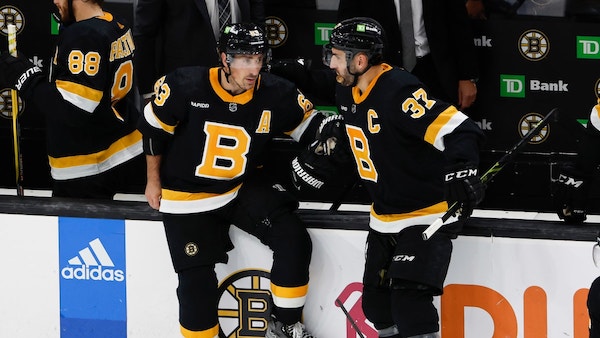
By: Van Alan | Follow me on Twitter @VanAlanClark
After setting a regular season record for wins, the 2022-2023 Boston Bruins lost in the first round of the playoffs to the Florida Panthers, a team that won just two games more than they lost in the regular season. It’s the biggest upset in NHL history. It’s probably the worst loss in franchise history. As Boston Sports tragedies go, it might be the very worst. It sucks. And as we fans try to process this, we have to ask this simple question – how good was this Bruins team?
There are “fans” (READ: trolls) who will tell you they knew this all along. That this team was never actually good. They were always frauds. They were always going to choke in the playoffs. They always knew they wouldn’t win the Cup. Blah, Blah, Blah.
I will not entertain that notion because it takes the players and the coaches off the hook. It makes it sound like they were never actually good in the first place, so losing isn’t their fault and was to be expected. That is not true. This Bruins team was the deepest, most complete, most confident, most professional, and most composed team I have ever seen. Maybe one player dressed in this series wasn’t good enough or too good for the role he was being asked to play. This team and this coach had everything they needed to win this series and make a long playoff run, and they didn’t. They buckled under the pressure. You can’t let them off the hook by saying they weren’t good enough. They were.
Furthermore, “I knew they wouldn’t win” is an incredibly easy thing to say. 15 of the 16 teams that qualify for the playoffs lose their last game of the season and go home unhappy. Predicting something that has a 93% chance of happening doesn’t make you Nostradamus.
The Bruins were clearly not as good as their record, but I think we all knew that. They were definitely contenders. I still think they were the most complete team in the NHL. But were they actually 22 points better than the second-best team (Carolina)? No. And no team that wins 60 games in the salary cap era is really that good. To do that, you have to get more than your fair share of breaks, and the Bruins certainly did. Furthermore, the Panthers were clearly much better than their record. Both the underlying analytics and their performance in this series bears that out.
This doesn’t mean the Bruins weren’t a good team. They were. They were very good. They came within inches of winning that series on about seven separate occasions. But they didn’t do it. They put incredible pressure on themselves with the regular season that they had, and they cracked under it. They weren’t as good as we thought, but they were certainly good enough to beat the Panthers and do more in the playoffs. They should have. They didn’t. They failed. It’s on them.
So What Happened?
Probably the easiest (and perhaps the nicest) way to explain the 2022-2023 Bruins is this – if this was a 50-game season, they might be holding the Cup over their heads right now.
This season was all about bringing back their old war horses – Patrice Bergeron and David Krejci – and giving them one last shot at a Cup. And for a while, it went ridiculously well. The Bruins shredded the league in the first half. They were dominant by every measure. But the older players that the Bruins were heavily relying on couldn’t quite make it to the finish line.
Bergeron herniated a disk in his back in game 82, forcing him to miss the first four games of the playoffs. He returned for games 5-7 but did not look like himself. The minus-4 next to his name is a blemish on an otherwise glibering resume.
Krejci, scoring at a near-point-per-game pace in the first half, faded down the stretch, finally picking up a lower-body injury late in the year that forced him to miss the final six games of the regular season. He returned for the first two games of the playoffs but didn’t look good before picking up another injury that forced him out of games three and five. Krejci summoned up one last vintage “Playoff Krech” performance in game seven, pulling the Bruins off the mat and back into the game with a goal and two assists. It wasn’t enough.
34-year-old Brad Marchand, playing on two surgically repaired hips, didn’t look right all season. He pulled himself together for the playoffs and delivered a very strong first six games. But he posted a real dud in game seven. He was on the ice for the game-tying and the game-winning goal.
Even Nick Foligno, in the midst of a wonderful bounce-back season at 35, injured his knee just before the trade deadline. He returned for the playoffs and mixed strong games three and four with some other quite poor performances. His inability to get a stick on Conor Clifton’s admittedly off-target outlet pass led directly to Etuu Luostarinen’s game-winning goal in game six.
In the end, Boston was somewhat a victim of their own plan. But they still had the pieces to overcome it. They won games three and four without Bergeron and Krejci.
Should We Have Seen This Coming?
Maybe? The Bruins as a whole did fade in the second half of the season – after the All-Star break, they were a barely above-average team in Expected Goals For Percentage (xGF%) according to Natural Stat Trick but kept piling up wins due in large part to outstanding performances by David Pastrnak and Linus Ullmark. People used this data point to argue that the Bruins weren’t very good.
The problem I always had with that argument was it made it sound as if Pastrnak and Ullmark weren’t part of the team. “You’re only good because your two best players are playing really well” isn’t really a serious point. Unless you expected Pastrnak to stop scoring and Ullmark to stop making saves, you can’t say you saw this coming.
Pastrnak didn’t stop scoring. He staked the Bruins to third-period leads in game six and game seven. Ullmark stopped making saves.
If you’re looking for what happened to the Bruins, you have to start there. When you looked at the Panthers roster – and there is a lot of talent over there – the most obvious edge the Bruins had was in goal. Florida was relying on Alex Lyon and Sergei Bobrovsky. The Bruins lit that tandem up for 27 goals over the course of seven games. That’s approximately four goals per game. That should be enough to win.
However, the Bruins tandem with Vezina favorite Ullmark and the under-uNlized Jeremy Swayman let in 24. The goaltending simply wasn’t good enough. Whether it was injury, illness, exhaustion, or simple nerves, Boston’s Vezina-caliber goalie did not play even close to his standard, and Head Coach Jim Montgomery waited far too long to make the switch to Swayman. It cost them.
Should The Bruins Stil Have Won?
Yes!
Goaltending was not Boston’s only obvious edge. They also had far and away, the better defense group. And the one thing I still can’t figure out, even after days of agonizing over this, is what on Earth the Bruins defensemen were doing in this series.
Boston had the best defense in the league this season. That evaporated the moment the playoffs started. They had all the tools to protect a struggling Ullmark and limit Florida’s scoring chances. They proved that in games three and four. But they spent the entire series chucking pizzas all over the ice in a maddening manner.
In game one, it was Dmitry Orlov putting a backhand pass right into his own slot. Matthew Tkachuk immediately deposited it in the back of Boston’s net. In game two, Brandon Carlo started the pizza party with a turnover that led to Sam Bennett’s game-opening goal. Charlie McAvoy exacerbated the problem with an even worse giveaway. Carter Verhage turned it into a third-period insurance goal.
They largely cleaned it up in games three and four, but in game five, Derek Forbort’s unnecessary icing put Florida up 2-1 on another Bennett goal. In game six, Conor Clifton had two of the worst giveaways you’ll ever see, leading to Florida’s second goal (Tkachuk again) and Luostarainen’s game-winner.
In game seven, it was Hampus Lindholm who put the puck right on a pinching Aaron Ekblad’s stick. Sam Reinhart made it 2-0 moments later. The only player who didn’t commit a notable costly turnover – Matt Grzelcyk – was repeatedly scratched in favor of Forbort and Clifton.
And these are just the turnovers that ended up in Boston’s net. There were many, many more.
Virtually everyone watching this series said that all Boston had to do to win was stop doing this. They had seven games to stop. They never did. I mentioned the Bruins cracking under pressure. This is the most obvious evidence of that.
They almost overcame it. Marchand had a breakaway in the closing seconds of game five. Pastrnak had a breakaway that, had he converted, would have put them up two in the third period of game six. An Orlov shot that would have put them up two with just over four minutes to go in game seven hit the crossbar. Pastrnak beat Bobrovsky cleanly 30 seconds into overtime. It hit the shaft of his stick and caromed into the corner.
This sucks, but the reality is that Boston continually shooting themselves in the foot shrunk their margin for error to the point that a few bad breaks could beat them. These bounces don’t hurt you like this if you aren’t so committed to continually handing Florida freebies. They put themselves in a position where a couple of bad breaks could beat them, and they did. They have only themselves to blame.
The Bruins weren’t as good as their record. But they had everything they needed to advance. Their goaltending fell apart. Their old war horses broke down. Their coach made a myriad of mind-melting decisions. But they still had a 3-1 lead in this series. Once they blew game five, they looked like a nervous team that was cracking under pressure, and that’s ultimately what happened.
They had everything they needed. They were a great team with no flaws. They were inches away from winning about 12 names. They didn’t. They failed. It sucks.


Leave a Reply